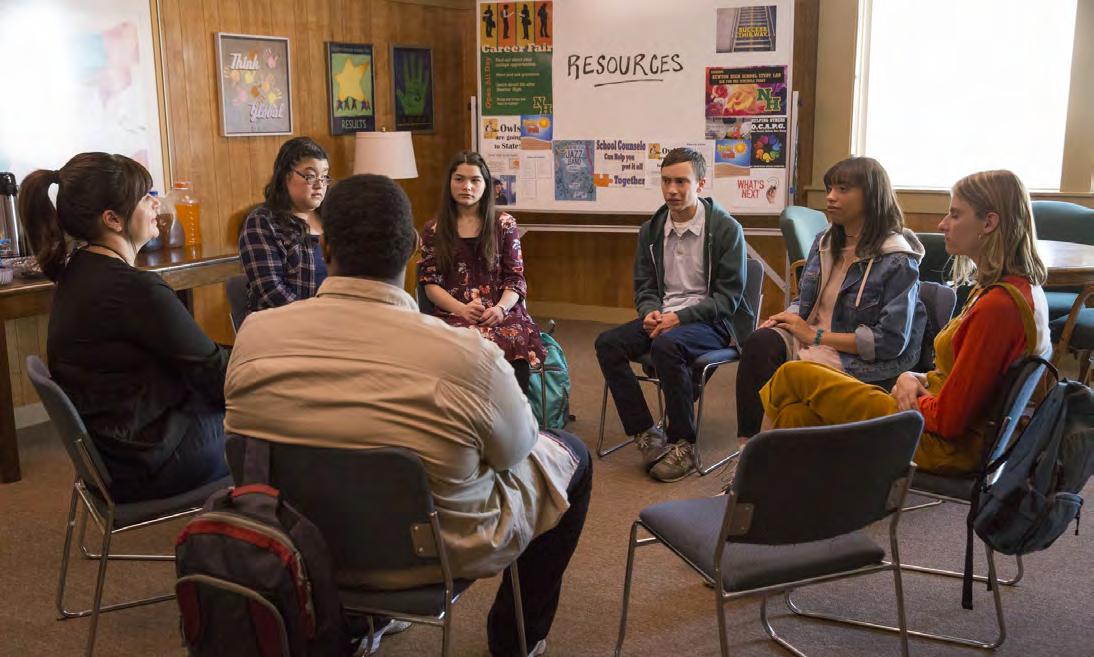
8 minute read
Parasocial Relationships
PROBLEM

Advertisement
-Ludwig Ahgren 2.6m Twitch followers That quote might raise some questions: Who is this person? Who is he talking to? And why doesn’t he want to be friends with them? I’ll answer those questions next, but first I’ll answer probably the most pressing question on your mind, what the hell is he talking about?


63


Parasocial relationships have been a hot-button issue to many as of late, for those who know of it at least. If you don’t follow content creators who talk about it, it’s pretty unlikely that you’d have heard of the concept of a parasocial relationship. Out of all content creators I’ve seen, none of them have been more vocal about the issue than the aforementioned Ludwig Ahgren. He’s made it abundantly clear to his audience that while he wants to be treated with respect, he also wants his viewers to treat him “the same way you treat a TV show”, even if it leads to a fnancial or viewer-growth loss. The issue has obviously been present in human psychology for as long -Oxford Reference

as there have been higher fgures to idolize and identify with, but many diferent factors have led to this becoming enough of a problem to bring to people’s attention, including the over-broadcasting nature of social media as well as the fact that some have raised concerns that some content creators may be outright manipulating or at least conveniently ignoring the issue because of the fnancial repercussions that acknowledging that some fans’ unhealthy relationships can have on growth. Twitch Streamer Mizkif who has accumulated over 1.5m followers since just late 2019, has also expressed the lengths that viewers can go to just interact with him:
“I feel that people like me [and other big streamers] have this relatability where people feel like they could be friends with us, and they feel like they could know us in real life which makes them more inclined to watch us over other people. [...]

I think the people that really try to make a friend out of me are the people who donate like crazy.
You’ll have guys that gift thousands and thousands of dollars and those people want either a lot of attention, or they’ll typically want to be my friend. They’re trying to buy their way into my life, I’ve had multiple people give me tons of money then ask for a favour like collabing with me or checking their DMs, and when they start trying to keep up conversation, then what am I gonna do? They just gave me thousands of dollars, I’m gonna feel guilty if I don’t answer their messages.” -Matt “Mizkif” Rinaudo 1.5m Twitch followers
The issue Mizkif talks about here is the idea that is - for better or worse - linked to all content creation online: Giving money to someone is a surefre way to get their attention. In specifcally streamers this manifests in donations. In a sea of literally thousands of messages sent by thousands of people every minute, donating $5 to lift your head above the water and get a direct message sent to your streamer may be the only way to be heard. I know all of this is a very cynical lens to look through, I believe that most people who pay a content creator in whatever method, genuinely just want to support someone they like who they know is a real person - typically not run by a team - in the easiest way they can which is giving back for the content they have received. In spite of this, I still think it’s important to specifcally highlight the lengths that the more captivated of fans can go to just to get some kind of interaction or attention from their favourite content creators to feel a sense of connection. This at its core, is what a parasocial relationship is.

p

I spoke w i t h Profes - sor of psychology at Victoria University Marc Wilson, who gave some insight into how parasocial relationships form, what consequences they can lead to psychologically and sociologically, and how the context that parasocial relationships are in has changed as media has evolved. I asked him what he thinks motivates people to “get into parasocial relationships” and if there’s any reason for people to be wary of the risk. His response was: ““Motivation” implies that there’s something that people are striving towards here, and that is the case, but it’s not that people are striving to engage in this one-sided relationship. Rather it refects two things. First, we are fundamentally social. This is evolutionary - we are more likely to survive if we are parts of groups. We’re very sensitive to feeling like we belong to the point that many experts say that belonging is a fundamental human need. We look for relationships in our environment to help us do this, and I think that these parasocial relationships are an indication that our ‘connection-detector’ t is overly-sensitive - we develop relationships even with people who don’t know of our existence. Second, we’re more likely to develop parasocial relationships with ‘people’ we ‘interact’ with regularly.” He later elaborated on the second point when I asked if he believed there to be any risk of parasocial relationships being fostered and manipulated intentionally and maliciously by content or media creators, he replied “I think we already have that. [In America especially] it’s relatively common that the people who produce the products, who are not necessarily the same people that produce the [entertainment] will take advantage of the fact that we already engage in some kind of relationship with [the entertainers]. [...] To some extent there probably have been parasocial relationships with characters and entertainers before the term was coined in the 1950s, but it’s much easier to do that if we can hear their voices and especially if we can see their faces as well.”

-Marc Wilson Victoria University

I wanted to clarify with a psychologist why people should care. There were obvious reasons that are more surface level that I touched on earlier, such as parasocially engaged fans donating sometimes exorbitant amounts of money to the unreasonable extremes all for attention from someone who doesn’t know they exist, but I wanted to know about more specifc mental ramifcations that engaging in an unhealthy parasocial obsession can have. I found interest in the topic of parasocial relationships because being a social media slave myself, I’d seen people online especially on Twitter or TikTok dedicating themselves to degrees that just felt of, and I wanted to learn why, and how long something like that would last. I fnally asked about what efects a parasocial relationship could have on someone mentally, where the line is crossed between a parasocial relationship, and whether there’s a certain group of people that are more at risk of tipping over. He replied: “If you’re completely obsessed to the point where you’re constantly rewatching or engaging and you aren’t taking care of yourself and doing the things that help you function in the real world then that becomes problematic. There’s some research that says that people who are lonely are more likely to develop parasocial relationships with media characters and entertainers. On one hand, that temporary solution may actually make you feel better, it may make you feel less lonely, but if it actually prevents you from going out there and engaging in face-to-face relationships, then that will have a passive negative efect on your well being because it’s preventing you from something that is pretty explicitly accepted as a good and healthy thing. [...] There are defnitely dimensions to it, it can escalate from things that feel normal, then it can grow up to that intense borderline problematic level, all the way up to full on obsessionality. Those who appreciate media on the frst level of it just being good entertainment, they can relate to it, the dynamic seems fun, are more likely to be extroverted and can lean towards an entertainment-social parasociality. Those who veer further and further towards the obsession side are probably not extroverts, they usually have other personality traits that can be problematic such as neuroti cism (people whose emotions are typically more variable or intense than other peoples).

“I get sent to me all the time: “Ludwig, you saved my life!” No, I didn’t save your life. What do you mean I saved your life? I’ve been playing Pokemon and Among Us. Where in that journey did I save your life? Did I pick up a scalpel and take out a tumour? No! All I did was play games, and you used me as a distraction to get through a bad period. You could’ve used Taylor Swift’s new album. You could’ve used anything but you used me. Don’t give the credit for the work you put in to me. You saved yourself.”

-Ludwig Ahgren
I want to end with some positives on a fairly negative article. Firstly, if you’re even just aware of the concept of the parasocial relationships, just that can make you less at risk of engaging too heavily. Staying connected to real people and fostering relationships with them, doesn’t just prevent the risk of engaging in a parasocial relationship, it’s also the main way to get out of one. A parasocial relationship will typically be centered on a human need for connection, and even if you’re not totally isolated they can also just exist to fll social gaps in any aspect of your life. Staying conscious will be benefcial to both yourself and to content creators who are also real people who won’t know how to deal with thousands of people relying on them. Question your consumption and you will be thankful of yourself.

Felix Quade











